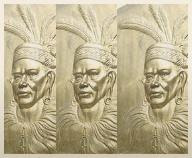
AS HEADMAN, Ladon anak Edieh allowed a state agency to start an agriculture pioneering project on his community’s land in Sungai Bawan in the Mukah division of Sarawak.
That was in the mid-1970s when the Sarawak Land Development Board (SLDB) introduced one of the earliest oil palm cultivation schemes on Iban communal land.
Rumah Ladon (Iban longhouses are named after the headmen) and 21 other longhouse communities agreed to the project, based on the official guarantee that respected their native customary rights (NCR) over the land.
The communities were duly consulted and SLDB even conducted rituals according to the people’s adat in obtaining consent for use of the land.
In 1975, it was agreed that a tasih (a token sum) of RM50 per acre for a total area of 9,800 acres for a period of 25 years was to be paid by SLDB. The villagers understood that the land would be returned to them upon expiry of the lease in 2000.
 The Ibans of Sungai Bawan, Mukah, Sarawak, protesting the alienation of their land. The communities of 22 longhouses later filed a suit, naming the Sarawak State Government among the defendants. – Picture courtesy of WONG MENG CHUO
The Ibans of Sungai Bawan, Mukah, Sarawak, protesting the alienation of their land. The communities of 22 longhouses later filed a suit, naming the Sarawak State Government among the defendants. – Picture courtesy of WONG MENG CHUOYears later, the villagers discovered that the Sarawak government issued a new provisional lease in 1989 to SLDB that not only covered the land cultivated by SLDB but extended over the longhouses, burial grounds and communal farmlands. This time around, there was no consultation, compensation nor were there any measures taken to extinguish the villagers' rights in accordance with the Sarawak Land Code.
Ladon’s son, Ambun, like others from the other longhouses, discovered that the land had been sold to an entity called Sarawak Plantation Agriculture Development Sdn Bhd (SPAD).
New seedlings were planted by SPAD but the company did not reply to letters from the communities – not until they erected a blockade in November 2005.
“When we put up the blockade, we were arrested and put in the police lock-up. Eleven of us were detained for two weeks, some were even re-arrested,” recalled Ambun.
A suit was filed in March last year against SLDB, the Superintendent for Lands and Surveys for Mukah Division and the State Government.
Ambun was one of three community leaders from the Iban tribe who attended the Roundtable for Sustainable Palm Oil (RSPO) in Kuala Lumpur recently.
The Sungai Bawan Ibans’ experience appears to be the norm in Sarawak, as documented in the report Land is Life: Land Rights and Oil Palm Development in Sarawak launched at the RSPO meeting.
The report revealed more than 100 legal cases where indigenous people are suing the government and companies for violations of their customary land rights. Over one-third of these cases involve oil palm development.
One of the four authors, Sarawak researcher Wong Meng Chuo, said the abuses committed by oil palm development by both state and private entities contradicted the standards developed under the RSPO initiative.
The report concluded that if Sarawak palm oil is not to be excluded from international markets, major changes in laws, policies and practices are required.
Communities in Kalimantan, Indonesia, are facing similar problems of land grabbing. Indonesian legislation classifies the ancestral domain as state-owned forests and the state retains control over the land.
Asmara Syahputra, 23, told a press conference organised by Sawit Watch that a RSPO member started planting on his communal land in 1996. When the community of Dayak Banuaq in Kutai Barat, Kalimantan sought to regain their land, they were intimidated, arrested and subjected to inhuman treatment.
Similar testimonies were made by four other indigenous representatives from other parts of Kalimantan and Sumatra.
Nurbaya Zulhakim of Jambi said RSPO should learn from the experiences of timber certification schemes that failed to address land tenure disputes.
Sawit Watch has, until mid-2007, registered 500 cases of communities facing encroachment upon their lands by oil palm companies.
Leading 10 other local NGOs and one foreign group, Sawit Watch had submitted a request last August, to a United Nations agency charged with eliminating racial discrimination, seeking its intervention in the eroded rights of indigenous people in Kalimantan.
The request was submitted in relation to plans to establish oil palm plantation along 850km of the Indonesia-Malaysia border as part of the Kalimantan Border Oil Palm Mega Project. This area is part of the traditional territories of Kalimantan’s Dayak community.
Being very much self-regulatory in nature, the RSPO is regarded as just the first step. RSPO president Jan-Kees Vis acknowledged that it was impossible to resolve all outstanding conflicts as “we don’t have all the answers”.
However, the 198-member grouping has listed “engaging the governments” as a challenge to move forward. - The Star Online
























